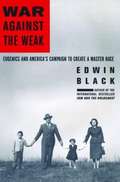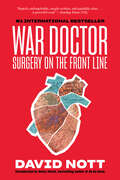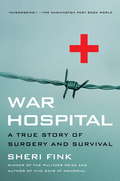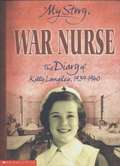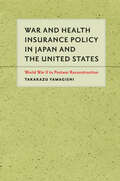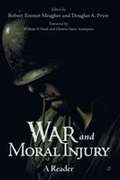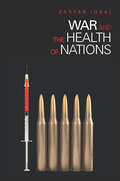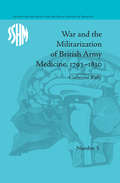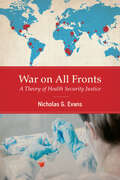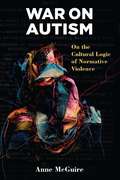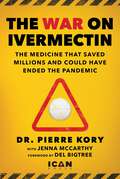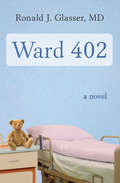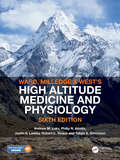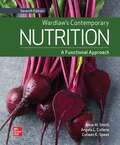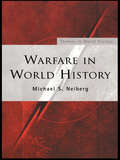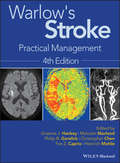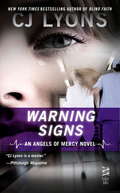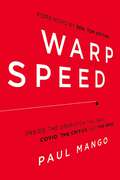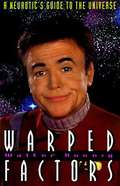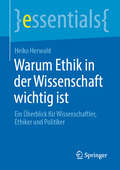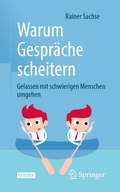- Table View
- List View
War Against The Weak: Eugenics And America's Campaign To Create A Master Race
by Edwin BlackIn War Against the Weak, award-winning investigative journalist Edwin Black connects the crimes of the Nazis to a pseudoscientific American movement of the early 20th century called eugenics. Based on selective breeding of human beings, eugenics began in laboratories on Long Island but ended in the concentration camps of Nazi Germany. Cruel and racist laws were enacted in 27 U.S. states, and the supporters of eugenics included progressive thinkers like Woodrow Wilson, Margaret Sanger, and Oliver Wendell Holmes. Ultimately, over 60,000 "unfit" Americans were coercively sterilized, a third of them after Nuremberg declared such practices crimes against humanity. This is a timely and shocking chronicle of bad science at its worst — with many important lessons for the impending genetic age.
War Doctor: Surgery on the Front Line
by David Nott#1 International Bestseller: A frontline trauma surgeon tells his “riveting” true story of operating in the world’s most dangerous war zones (The Times). For more than twenty-five years, surgeon David Nott has volunteered in some of the world’s most perilous conflict zones. From Sarajevo under siege in 1993 to clandestine hospitals in rebel-held eastern Aleppo, he has carried out lifesaving operations in the most challenging conditions, and with none of the resources of a major metropolitan hospital. He is now widely acknowledged as the most experienced trauma surgeon in the world. War Doctor is his extraordinary story, encompassing his surgeries in nearly every major conflict zone since the end of the Cold War, as well as his struggles to return to a “normal” life and routine after each trip. Culminating in his recent trips to war-torn Syria—and the untold story of his efforts to help secure a humanitarian corridor out of besieged Aleppo to evacuate some 50,000 people—War Doctor is a heart-stopping and moving blend of medical memoir, personal journey, and nonfiction thriller that provides unforgettable, at times raw, insight into the human toll of war.“Superb . . . You are constantly amazed that men such as Nott can witness the extraordinary cruelties of the human race, so many and so foul, yet keep going.” —Sunday Times“Gripping and fascinating medical stories.” —Kirkus Reviews
War Hospital: A True Story Of Surgery And Survival
by Sheri Lee FinkIn April 1992, a handful of young physicians, not one of them a surgeon, was trapped along with 50,000 men, women, and children in the embattled enclave of Srebrenica, Bosnia-Herzegovina. There the doctors faced the most intense professional, ethical, and personal predicaments of their lives. Drawing on extensive interviews, documents, and recorded materials she collected over four and a half years, doctor and Pulitzer Prize-winning journalist Sheri Fink tells the harrowing--and ultimately enlightening--story of these physicians and the three who try to help them: an idealistic internist from Doctors without Borders, who hopes that interposition of international aid workers will help prevent a massacre; an aspiring Bosnian surgeon willing to walk through minefields to reach the civilian wounded; and a Serb doctor on the opposite side of the front line with the army that is intent on destroying his former colleagues. With limited resources and a makeshift hospital overflowing with patients, how can these doctors decide who to save and who to let die? Will their duty to treat patients come into conflict with their own struggle to survive? And are there times when medical and humanitarian aid ironically prolong war and human suffering rather than helping to relieve it?
War Nurse: The Diary of Kitty Langley, 1939-1940 (My Story)
by Sue ReidThis is the diary of Kitty, an 18-year-old VAD (Voluntary Aid Detachment), during the years of 1939 and 1940. As a nurse working in the military hospitals in the south of England, Kitty sees at close hand the effects of war - notably the casualties of Dunkirk. The diary details the historical events and describes the day to day life of a young VAD in a military hospital in WWII. It's also a story about growing up. She is a girl transposed from a comfortable protected existence into the harsher world of a wartime hospital who begins to learn a bit about life and relationships.
War and Health Insurance Policy in Japan and the United States: World War II to Postwar Reconstruction
by Takakazu YamagishiWorld War II forced extensive and comprehensive social and political changes on nations across the globe. This comparative examination of health insurance in the United States and Japan during and after the war explores how World War II shaped the health care systems of both countries.To compare the development of health insurance in the two countries, Takakazu Yamagishi discusses the impact of total war on four factors: political structure, interest group politics, political culture, and policy feedback. During World War II, the U.S. and Japanese governments realized that healthy soldiers, workers, mothers, and children were vital to national survival. While both countries adopted new, expansive national insurance policies as part of their mobilization efforts, they approached doing so in different ways and achieved near-opposite results. In the United States, private insurance became the predominant means of insuring people, save for a few government-run programs. Japan, meanwhile, created a near-universal, public insurance system. After the war, their different policy paths were consolidated. Yamagishi argues that these disparate outcomes were the result of each nation’s respective war experience. He looks closely at postwar Japan and investigates how political struggles between the American occupation authority and U.S. domestic forces, such as the American Medical Association, helped solidify the existing Japanese health insurance system.Original and tightly argued, this volume makes a strong case for treating total war as a central factor in understanding how the health insurance systems of the two nations grew, while bearing in mind the dual nature of government intervention—however slight—in health care. Those interested in debates about health care in Japan, the United States, and other countries, and especially scholars of comparative political development, will appreciate and learn from Yamagishi’s study.
War and Moral Injury: A Reader
by Robert Emmet Meagher Douglas A. PryerMoral Injury has been called the "signature wound" of today's wars. It is also as old as the human record of war, as evidenced in the ancient war epics of Greece, India, and the Middle East. But what exactly is Moral Injury? What are its causes and consequences? What can we do to prevent or limit its occurrence among those we send to war? And, above all, what can we do to help heal afflicted warriors? This landmark volume provides an invaluable resource for those looking for answers to these questions. Gathered here are some of the most far-ranging, authoritative, and accessible writings to date on the topic of Moral Injury. Contributors come from the fields of psychology, theology, philosophy, psychiatry, law, journalism, neuropsychiatry, classics, poetry, and, of course, the profession of arms. Their voices find common cause in informing the growing, international conversation on war and war's deepest and most enduring invisible wound. Few may want to have this myth-challenging, truth-telling conversation, but it is one we must have if we truly wish to help those we send to fight our wars.
War and the Health of Nations
by Zaryab IqbalAssessments of the costs of war generally focus on the financial, political, military, and territorial risks associated with involvement in violent conflict. Often overlooked are the human costs of war, particularly their effects on population well-being. InWar and the Health of Nations, Zaryab Iqbal explores these human costs by offering the first large-scale empirical study of the relationship between armed conflict and population health. Working within the influential "human security" paradigm-which emphasizes the security of populations rather than states as the central object of global security-Iqbal analyzes the direct and indirect mechanisms through which violent conflict degrades population health. In addition to battlefield casualties, these include war's detrimental economic effects, its role in the creation of refugees and forced migration, and the destruction of societies' infrastructure. In doing so, she provides a comprehensive picture of the processes through which war and violent conflict affect public health and the well-being of societies in a cross-national context. War and the Health of Nationsprovides a conceptual and theoretical framework for understanding the influence of violent interstate and intrastate conflict on the quality of life of populations and empirically analyzes the war-and-health relationship through statistical models using a universal sample of states. The analyses provide strong evidence for the direct as well as the indirect effects of war on public health and offer important insights into key socio-economic determinants of health achievement. The book thus demonstrates the significance of population health as an important consequence of armed conflict and highlights the role of societal vulnerabilities in studies of global security.
War and the Militarization of British Army Medicine, 1793–1830 (Studies for the Society for the Social History of Medicine #5)
by Catherine KellyThis study demonstrates the emergence and development of the identity of the ‘military medical officer’ and places their work within the broader context of changes to British medicine during the first half of the nineteenth century.
War in the Body: The Evolutionary Race Between HIV and the Human Immune System and the Implications for Vaccines
by Otto O Yang W David WickIn the relatively few decades since the introduction of HIV into the human population, variants of the virus have diverged to such an extent that, were the discussion about something other than viruses, said variants could easily be classified as different species. This book will consider these evolutionary variations, as well as the different and, at times, opposing theories attempting to explain them. It will compare and contrast the ways in which the immune system and drugs affect the virus's evolution, and the implications of these for vaccine development. The issue will be explored and explained through "ecological genetics," which postulates that all living organisms have, besides rivals, enemies. This is divergent from the more traditional school of "population genetics," which emphasizes that evolution occurs among rival species (or variants thereof) that compete for niches or resources in a fixed, unreactive environment. Both models will be formulated using mathematical models, which will be included in the book. Finally, it will consider the possibilities for designing a vaccine that blocks HIV from escaping the immune system.
War on All Fronts: A Theory of Health Security Justice
by Nicholas G. EvansAn argument for the centrality of rights in health security, and how to apply ethical principles to protecting those rights during public health crises.In recent years, efforts to respond to infectious diseases have been described in terms of national and global security, leading to the formation of the field of &“health security.&” In War on All Fronts, Nicholas G. Evans provides a novel theory of just health security and its relation to the practice of conventional public health. Using COVID-19 as a jumping-off point to examine wider issues, including how the US thinks about and prepares for pandemics, Evans shows the flaws in using the &“war metaphor" and how any serious understanding of health security must square with human rights—even when a disease poses a threat to national security. Evans asks what ethical principles justify declaring, and taking action during, a public health emergency such as the ongoing COVID-19 pandemic. The relevant principles, he argues, parallel those of the ethics of armed conflict. Just war theory, properly understood, begins with pacifism and a commitment to the right not to be killed and then steps back to ask under what limited conditions it is permissible to kill. In a similar way, a just health security must also begin with the idea that public health should hold human rights sacrosanct and then ask under what limited conditions other concerns might prevail. Evans&’s overall goal is to formulate a guide to action, particularly as the world deals with the fallout of the COVID-19 pandemic. Turning to the transition from war back to peace in public health, he looks at reparation, rebuilding, and the accountability of actors during the crisis.
War on Autism: On the Cultural Logic of Normative Violence
by Anne McguireWar on Autism examines autism as a historically specific and powerladen cultural phenomenon that has much to teach about the social organization of a neoliberal western modernity. Bringing together a variety of interpretive theoretical perspectives including critical disability studies, queer and critical race theory, and cultural studies, the book analyzes the social significance and productive effects of contemporary discourses of autism as these are produced and circulated in the field of autism advocacy. Anne McGuire discusses how in the field of autism advocacy, autism often appears as an abbreviation, its multiple meanings distilled to various "red flag" warnings in awareness campaigns, bulleted biomedical "facts" in information pamphlets, or worrisome statistics in policy reports. She analyzes the relationships between these fragmentary enactments of autism and traces their continuities to reveal an underlying, powerful, and ubiquitous logic of violence that casts autism as a pathological threat that advocacy must work to eliminate. Such logic, McGuire contends, functions to delimit the role of the "good" autism advocate to one who is positioned "against" autism.
War on Ivermectin: The Medicine that Saved Millions and Could Have Ended the Pandemic
by Pierre Kory Jenna McCarthyBig Pharma and health agencies cry, &“Don&’t take ivermectin!&” A media storm follows. Why then, does the science say the opposite?&” Ivermectin is a dirty word in the media. It doesn&’t work. It&’s a deadly horse dewormer. Prescribe or promote it and you&’ll be called a right-wing quack, be banned from social media, or lose your license to practice medicine. And yet, entire countries wiped out the virus with it, and more than ninety-five studies now show it to be unequivocally effective in preventing and treating Covid-19. If it didn&’t work, why was there a coordinated global campaign to cancel it? What&’s the truth about this decades-old, Nobel Prize-winning medication? The War on Ivermectin is the personal and professional narrative of Dr. Pierre Kory and his crusade to recommend a safe, inexpensive, generic medicine as the key to ending the pandemic. Written with Jenna McCarthy, Dr. Kory&’s story chronicles the personal attacks, professional setbacks, and nefarious efforts of the world&’s major health agencies and medical journals to dismiss and deny ivermectin&’s efficacy. Part personal narrative, part scathing expose, The War on Ivermectin highlights the catastrophic impacts of the mass media censorship and relentless propaganda that led to the greatest humanitarian crisis in history. Although numerous studies and epidemiologic data have shown that millions of lives were saved globally with the systematic use of ivermectin, many more millions perished. This carnage was the direct result of what Dr. Kory eventually discovered to be the pharmaceutical industry&’s silent but deadly war on generic medicines and the corrupt, captured medical and media systems that allow it to continue. For anyone who thought Covid-19 was the enemy, Dr. Kory&’s book will leave no doubt that the true adversary in this war is a collective cabal of power-hungry elites who put profits over people and will stop at nothing in their quest for control.The War on Ivermectin is published through ICAN PRESS, an imprint of Skyhorse Publishing. ICAN (Informed Consent Action Network) is a nonprofit organization investigating the safety of medical procedures, pharmaceutical drugs, and vaccines while advocating for people&’s right to informed consent.
Ward 402
by Ronald J. GlasserAgainst all odds, an 11-year-old girl clings to the slender thread of life in a hospital. For the dedicated young physician, there were also human concerns.
Ward 402: A Novel
by Ronald J. GlasserFrom the author of 365 Days comes a poignant, personally inspired tale of a rookie doctor fighting for the life of a desperately ill young girl—a story that grows ever more relevant in this world of increasingly sophisticated and technical medical careIn this riveting and passionately rendered novel, an intern faces the harsh realities of his profession, and the overwhelming highs and lows for which medical school was unable to prepare him. The call comes at three in the morning, ordering the intern to handle a new admission at the pediatric ward of the university hospital. He finds eleven-year-old Mary Berquam, diagnosed with advanced leukemia. The doctors think they might be able to give her drug therapies and put her in remission, but her parents know Mary&’s disease is fatal and they want to keep her comfortable rather than put her through painful treatments. The young intern must confront what it means to follow the conventions of his job versus the calling of his conscience.
Ward, Milledge and West’s High Altitude Medicine and Physiology
by Andrew M Luks Philip N Ainslie Justin S Lawley Robert C Roach Tatum S SimonsonThis pre-eminent work has developed over six editions in response to man's attempts to climb higher and higher unaided, and to spend more time at altitude for both work and recreation. Building on this established reputation, the new and highly experienced authors provide a fully revised and updated text that will help doctors continue to improve the health and safety of all people who visit, live or work in the cold, thin air of high mountains.The sixth edition remains invaluable for any doctor accompanying an expedition or advising patients on a visit to altitude, those specialising in illness and accidents in high places, and for physicians and physiologists who study our dependence on oxygen and the adaptation of the body to altitude.
Wardlaw's Contemporary Nutrition: A Functional Approach
by Gordon M. Wardlaw Anne M. Smith Angela Collene Colleen K. SpeesContemporary Nutrition: A Functional Approach is an alternate version of Smith, Collene, Spees Contemporary Nutrition, offering a unique approach by organizing vitamins and minerals within the context of physiological functions and the health conditions they influence. Current research is at the core of the fifth edition, with revised statistics, incorporation of new results of clinical trials, and updated recommendations. <p><p>The text provides students who lack a strong science background the ideal balance of reliable nutrition information and practical consumer-oriented knowledge. Always looking to make the content relevant to learners, the authors highlight health conditions, medications, food products, and supplements students or members of their families may be using. With their friendly writing style, the authors act as the student’s personal guide to dispelling common misconceptions and to gaining a solid foundation for making informed nutrition choices.
Wardlaw's Contemporary Nutrition: A Functional Approach
by Angela Collene Anne Smith Colleen SpeesContemporary Nutrition: A Functional Approach is an alternate version of Smith, Collene, Spees Contemporary Nutrition, offering a unique approach by organizing vitamins and minerals within the context of physiological functions and the health conditions they influence. Current research is at the core of this text, with revised statistics, incorporation of new results of clinical trials, and updated recommendations. The text provides students who lack a strong science background the ideal balance of reliable nutrition information and practical consumer-oriented knowledge.
Warfare in World History: New Directions In First World War Studies (Themes In World History Ser. #62)
by Michael S. NeibergDespite the catastrophic effects of war, wars have also proved to be instrumental to long-term change in world history This text is the first of its kind to survey how warfare has developed from ancient times to the present day and the role it has played in shaping the world we know. The periods discussed include:* the pre-gunpowder era* the develo
Warlow's Stroke: Practical Management
by Philip B. Gorelick Malcolm Macleod Graeme J. Hankey Christopher Chen Fan Z. Caprio Heinrich MattleA practical textbook, based on a problem-oriented workflow, that will improve patients' likelihood of full recovery from stroke and prevent future strokes from occurring Stroke is the leading cause of adult disability and is in the top five causes of death globally. Warlow's Stroke: Practical Management, 4th Edition takes a problem-oriented approach and addresses the questions posed by a stroke patient in the order they are likely to present in clinical practice, for instance, 'Is it a stroke?', 'What sort of stroke?', 'What caused it?', and 'What can be done about it?'. Beginning with chapters phrased as questions, the book walks the reader through a standard clinical workflow, exploring the practical skills and assessment required at each stage of patient management. Early chapters cover: locating the vascular lesion, identifying the involved arterial territory, the role imaging should play, and the application thereof. Subsequent chapters look at what causes a transient or persistent ischemic event, an intracerebral hemorrhage and a subarachnoid hemorrhage. Unusual causes of ischemic stroke and transient ischemic attack are also covered. The book then presents a practical approach to the management of stroke and transient ischemic attack; offers specific treatments for acute ischemic stroke and aneurysmal subarachnoid hemorrhage; provides ways for professionals to prevent first or recurrent stroke; and more. Final chapters of the book discuss rehabilitation after stroke, how patients and carers can be supported in the short term and long term, prevention of recurrent stroke, and the organization of stroke services. Warlow's Stroke: Practical Management, 4th Edition Follows clinical workflow for stroke analysis Features evidence-based approach throughout Offers practical application aimed at improving patient outcomes Written and edited by internationally renowned experts in the field An essential resource for all practitioners involved in the care of patients who suffer from cerebrovascular disease, but particularly suitable for neurologists, residents, geriatricians, stroke physicians, radiologists and primary care physicians.
Warning Signs
by C. J. LyonsNew York Times bestselling author CJ Lyons returns to the front lines of the struggle between life and death in the second Angels of Mercy novel... On rotation at Pittsburgh's Angels of Mercy Hospital and struggling to finish medical school, Amanda Mason can't afford to make any mistakes--or to reveal a troubling secret. Mysterious symptoms that defy diagnosis have been affecting her performance, and as she struggles to keep control, the only person who seems to notice is the irritatingly observant and sexy Dr. Lucas Stone. But when one patient starts experiencing the same strange symptoms dies and another slips into a coma, Amanda realizes the clock is ticking on her own survival. With the help of her friends--Gina, a roommate recovering from her own trauma; Lydia, a streetwise ER attending; and Nora, a by-the-book charge nurse--Amanda must solve this medical mystery before she becomes the next victim... Warning Signs includes a teaser for the third Angels of Mercy novel, Urgent Care.
Warp Speed: Inside the Operation That Beat COVID, the Critics, and the Odds
by Tom Cotton Paul MangoA powerful story of how our nation&’s leaders overcame the odds, saving the American people from the throes of a deadly pandemic. The prior record for vaccine development and distribution was approximately 4.5 years. Operation Warp Speed got the COVID-19 vaccine to the American people in less than 10 months. Operation Warp Speed did not happen by accident. It was the result of exceptional leadership, explicit strategy, and unprecedented teamwork. Author Paul Mango, the foremost leader of Operation Warp Speed and the former deputy chief of US Health and Human Services, chronicles the challenges and real dangers of developing the vaccine. From the beginning, two lead scientists, Dr. Moncef Slaoui and Dr. Debra Birx, fought head to head on which vaccines had the greatest probability of success. Tensions grew as the Army Materiel Command and the Center for Disease Control debated on whether public health agencies or the private sector would take over vaccine distribution. Mango details the largest hurdle for the Operation Warp Speed team: though Pfizer, the first distribution company to deliver the mRNA vaccine, sought aid from the Federal Government, they refused the government&’s request to oversee safe manufacturing of the vaccine, eventually leading to a major scandal as Pfizer missed its contractual obligation to deliver 40 million doses by the end of 2020, the number of positive cases reaching a frightening peak all the while. In this harrowing, behind-the-scenes account of the most successful public-private partnership since World War II, we learn how the nation&’s biggest leaders accomplished the impossible. Through sheer will and exceptional commitment, a small group of leaders fulfilled its mission, making the United States the only country in the world which could offer a vaccine to any citizen by April 2021, scarcely 14 months after the genetic identification of the virus.
Warped Factors: A Neurotic's Guide to the Universe
by Walter Koenig"Beneath the tinsel of Hollywood," Oscar Levant once said, "is the real tinsel." Beneath that lies a cornucopia of absurd behavior and bizarre experiences that rival the most creative silver screen fiction. As a young transplant from New York in the 1950s and '60s Walter Koenig quickly came to know Hollywood as a place of energy and opportunity where life's uncertainties loomed large. Launching an acting career in this unpredictable cultural cauldron, he wound his way through various misadventures before finding he had attained a degree of success that surprised even him. This is Koenig's story--from growing up as the neurotic child of Russian immigrants in 1940s Manhattan through his rise to Star Trek fame as Pavel Chekov, Russian navigator of the U.S.S. Enterprise, and beyond. Not a typical Hollywood memoir, Warped Factors is anything but aloof. Koenig's very human narrative is full of the kind of insecurities and quirks anyone can relate to. With wry wit, striking candor, and a true gift for storytelling, Koenig takes us on a sometimes bumpy but often hilarious trip through his galaxy. Blind faith and a healthy sense of irony seem to sustain him as he relates a steady stream of anecdotes, including: *** * Pitching a story to an NBC producer who is in the midst of an out-of-body experience; * Having a loaded gun placed in his ear by a jealous manager; * Performing a controversial play that was interrupted by someone believed to be a member of the American Nazi party dressed in the uniform of a Chicken Delight delivery boy; * Getting fired from a CBS movie of the week for staring at the director; * Being mistaken for a bellhop during a public appearance in his Star Trek uniform; * Declining a Star Trek convention attendee's invitation to help sacrifice a chicken in her hotel room. Of course, this amusing memoir also takes us behind the scenes of Star Trek, with fresh perspectives not only on the cast members themselves but also on the development and evolution of the megalithic sci-fi legend. In fact, Koenig includes a number of the script ideas he himself pitched over the years, including a proposed outline for Star Trek VI (one that saw the deaths of several main crew members, including Kirk) and several for The Next Generation series. Also included are Koenig's notes to producer Harve Bennett on Star Trek IT. The Wrath of Khan, as well as his commentary on several other projects. Finally, Koenig offers candid reflections not only on the Star Trek years but on his life and career since. Most notable are his well-received stints on stage and his current role as the insidious Alfred Bester on television's Babylon S. Enjoying both critical and popular success, Koenig has once again confirmed his enduring position in science fiction's acting pantheon.
Warrior Marks
by Alice Walker Pratibha ParmarHow the film "Warrior Marks" was made, which is about female genital mutilation and the sexual blinding of women in Africa.
Warum Ethik in der Wissenschaft wichtig ist: Ein Überblick für Wissenschaftler, Ethiker und Politiker (essentials)
by Heiko HerwaldUnser heutiges Leben ist wie in keiner anderen Epoche in der Geschichte der Menschheit durch technische und wissenschaftliche Erneuerungen geprägt. Beides hat zwar in einigen Teilen der Welt zu verbesserten Lebensbedingungen geführt, aber der Fortschritt hat auch einen hohen Preis. Denn die Menschheit steht vor sehr großen Herausforderungen, wie es beispielsweise die Corona-Krise zeigt. Diese und andere Probleme werden in Zukunft kaum zu bewältigen sein, wenn nicht bald ein drastisches Umdenken stattfindet. Um eine Veränderung zugunsten einer verbesserten Zukunft herbeizuführen, wird die Wissenschaft einen wichtigen Beitrag leisten müssen. Neue wissenschaftliche Konzepte und Maßnahmen können aber nur verwirklicht werden, wenn sie Zielsetzungen für das Allgemeinwohl verfolgen. Um diese durchzusetzen, muss die Wissenschaft sich an ethische Prinzipien halten, weil nur sie garantieren, dass Forschung im Interesse des Gemeinwohls betrieben werden kann.
Warum Gespräche scheitern: Gelassen mit schwierigen Menschen umgehen
by Rainer SachseDieser Ratgeber hilft Ihnen, wenn Sie im Alltag regelmäßig schwierigen Interaktionssituationen ausgesetzt sind. Beispiel: Interaktionspartner kritisieren, werten ab, reagieren ärgerlich aus scheinbar nichtigen Anlässen, geben Anweisungen, ohne dazu berechtigt zu sein, manipulieren usw. Solche Handlungen gehen meist von Personen aus, die sogenannte Persönlichkeitsstile oder Persönlichkeitsstörungen aufweisen. Sie empfinden das als stressig, unangenehm, belastend oder ärgerlich und es ist meist schwierig, konstruktiv damit umzugehen? Dann sind Sie in bester Gesellschaft. Das Buch soll verständlich machen, warum Personen solche Handlungen ausführen, was sie damit wollen und wie Sie konstruktiv damit umgehen können. Geeignet für Partnerschaft, Familie, bei der Arbeit mit Kollegen und Chefs oder auch bei Menschen, mit denen man nur wenig (aber schwierigen) Kontakt hat. Hilfreiche Strategien aus dem Inhalt: Gelassen bleiben, entspannt bleiben – nicht aggressiv reagieren – nicht mit gleicher Strategie aufwarten – nicht defensiv reagieren – souverän bleiben. Über den Autor: Prof. Dr. Rainer Sachse macht komplexe psychologische Sachverhalte allgemein verständlich und stellt sie humorvoll und einfühlsam dar. Das ist für Laien ebenso mit Gewinn lesbar wie für Fachkolleginnen und -kollegen.
